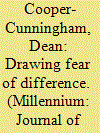| Srl | Item |
| 1 |
ID:
172343


|
|
|
|
|
| Summary/Abstract |
Feminist scholars have provided important analyses of the gendered and racialised discourses used to justify the Global War on Terror. They show how post-9/11 policies were made possible through particular binary constructions of race, gender, and national identity in official discourse. Turning to popular culture, this article uses a Queer feminist poststructuralist approach to look at the ways that Ms. Marvel comics destabilise and contest those racialised and gendered discourses. Specifically, it explores how Ms. Marvel provides a reading of race, gender, and national identity in post-9/11 USA that challenges gendered-racialised stereotypes. Providing a Queer reading of Ms. Marvel that undermines the coherence of Self/Other binaries, the article concludes that to write, draw, and circulate comics and the politics they depict is a way of intervening in international relations that imbues comics with the power to engage in dialogue with and (re)shape systems of racialised-gendered domination and counter discriminatory legislation.
|
|
|
|
|
|
|
|
|
|
|
|
|
|
|
|
| 2 |
ID:
187115


|
|
|
|
|
| Summary/Abstract |
Focusing on the case of ‘Gay Clown Putin’, this article theorizes memes as visual interventions in international politics. While not all memes are political interventions, Gay Clown Putin is an iconic meme that is part of the international response to Russian state-directed political homophobia that emerged after the gay propaganda law was passed in 2013. How it has circulated and the attention it has received make it apt for exploring memes as visual political interventions that challenge national security discourses. Here, I provide three readings of Gay Clown Putin that suggest different possibilities for how the meme might work politically. In so doing, I deepen international relations’ engagement with queer theory by bringing in the politics of play that works through a queer epistemology that embraces deviance. Bringing memes to the study of international security, I show how the collection of images making up the Gay Clown Putin meme provides space for understanding the visual politics of security.
|
|
|
|
|
|
|
|
|
|
|
|
|
|
|
|